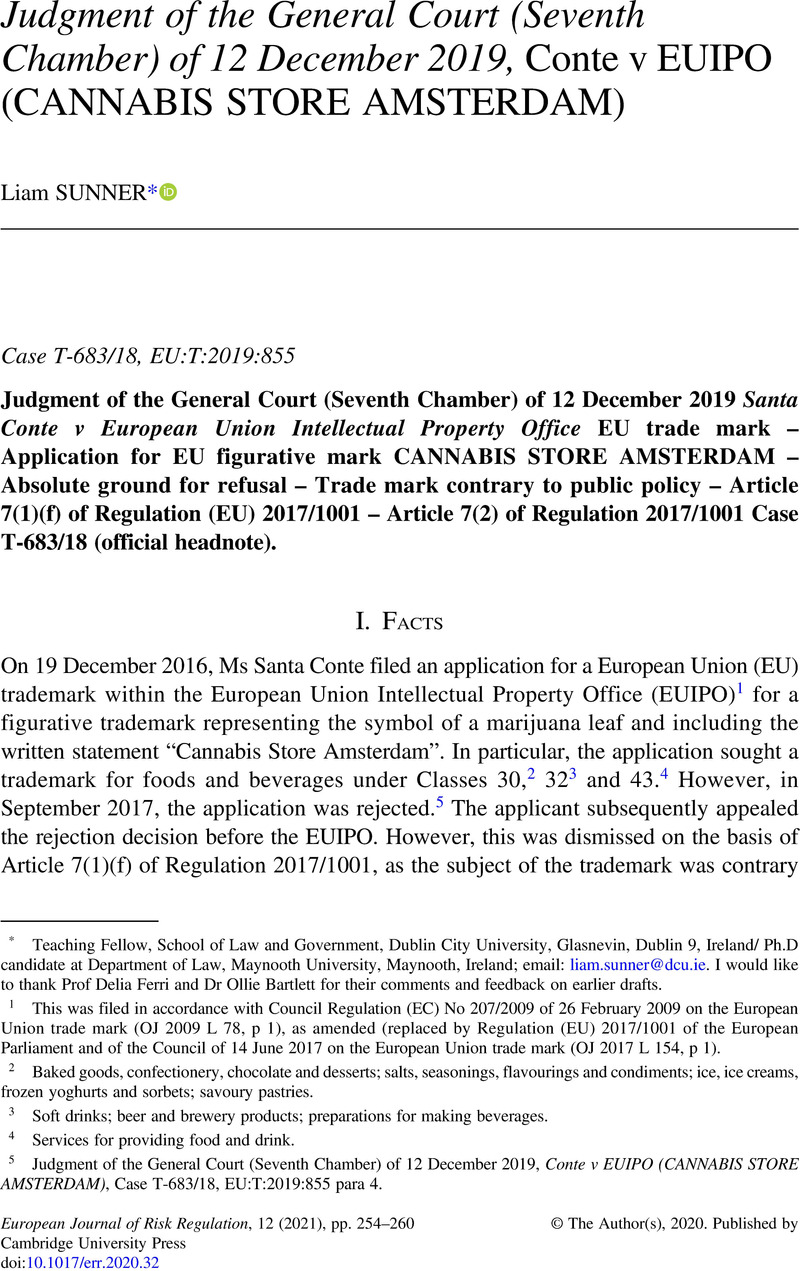No CrossRef data available.
Published online by Cambridge University Press: 12 October 2020

I would like to thank Prof Delia Ferri and Dr Ollie Bartlett for their comments and feedback on earlier drafts.
1 This was filed in accordance with Council Regulation (EC) No 207/2009 of 26 February 2009 on the European Union trade mark (OJ 2009 L 78, p 1), as amended (replaced by Regulation (EU) 2017/1001 of the European Parliament and of the Council of 14 June 2017 on the European Union trade mark (OJ 2017 L 154, p 1).
2 Baked goods, confectionery, chocolate and desserts; salts, seasonings, flavourings and condiments; ice, ice creams, frozen yoghurts and sorbets; savoury pastries.
3 Soft drinks; beer and brewery products; preparations for making beverages.
4 Services for providing food and drink.
5 Judgment of the General Court (Seventh Chamber) of 12 December 2019, Conte v EUIPO (CANNABIS STORE AMSTERDAM), Case T-683/18, EU:T:2019:855 para 4.
6 ibid, para 6.
7 ibid, para 7.
8 ibid, para 9.
9 ibid, para 13.
10 ibid, para 15.
11 ibid, para 19.
12 ibid, para 20.
13 ibid, para 21.
14 ibid, para 23. The Court also added that the alternatives suggested were obiter statements, and could not have rendered the decision unlawful.
15 ibid, paras 23–25.
16 ibid, para 26.
17 ibid, para 34.
18 ibid, para 41. The Court also briefly examined the Latin origin of the word “cannabis”, as well as the linkage of the word “Amsterdam” with the use of legal marijuana.
19 ibid, para 42.
20 ibid, para 45. In this connection, the Court also held that the BOA’s definition of the relevant public and its level of attention was correct.
21 ibid, para 47.
22 ibid, para 49.
23 ibid, para 52.
24 ibid, para 56.
25 ibid, para 62.
26 ibid, para 69
27 ibid, para 71. For example, public policy does not encompass economic interests, nor does it ensure that the social order is free from disturbance.
28 ibid, para 73.
29 ibid, para 74.
30 ibid, para 76.
31 ibid, paras 77–79.
32 ibid, para 80.
33 J Schovsbo and T Riis, “Public Policy Limitations of Trade Mark Subject Matter – An EU Perspective” <https://papers.ssrn.com/sol3/papers.cfm?abstract_id=3188013> 10. See also Judgment of 15 March 2018, La Mafia SE SIENTA A LA MESA, T-1/17, EU:T:2018:146, para 25: “The public interest underlying the absolute ground for refusal laid down in [Art. 7(1)(f)EUTR] is to ensure that signs which, when used in the European Union, would be contrary to public policy or to accepted principles of morality are not registered”.
34 Opinion of the Advocate General Bobek, of 2 July 2019, Constantin Film Produktion v EUIPO, C-240/18 P, EU:C:2019:553, para 76.
35 Kur, A and Senftleben, M, European Trade Mark Law: A Commentary (Oxford, Oxford University Press 2017)CrossRefGoogle Scholar para 4205.
36 Rosati, E, “General Court confirms that ‘La Mafia se sienta a la mesa’ cannot be a trade mark on public policy grounds” (2018) 13(6) Journal of Intellectual Property Law and Practice 433 CrossRefGoogle Scholar, 434.
37 Conte v EUIPO (CANNABIS STORE AMSTERDAM), supra, note 5, para 34. Also see Judgment of 15 March 2018, La Mafia SE SIENTA A LA MESA, T-1/17, EU:T:2018:146, para 28.
38 La Mafia SE SIENTA A LA MESA, supra, note 37, para 45.
39 While there may be an indirect advocation by the proliferation of the word “cannabis” and its entry into the public lexicon as a result of trademark allowances.
40 Judgement of the Court of 19 November 2009, Torresan v OHMI – Klosterbrauerei Weissenohe (CANNABIS), T-234/06, EU:T:2009:448.
41 EUIPO decision of 2 February 2005, available online: <https://euipo.europa.eu/eSearchCLW/#basic/*///name/ave%20maria>.
42 For example, a search of the EUIPO database lists 17 registered trademarks referring to “Cocaine” and 135 registered trademarks referring to “Cannabis”.